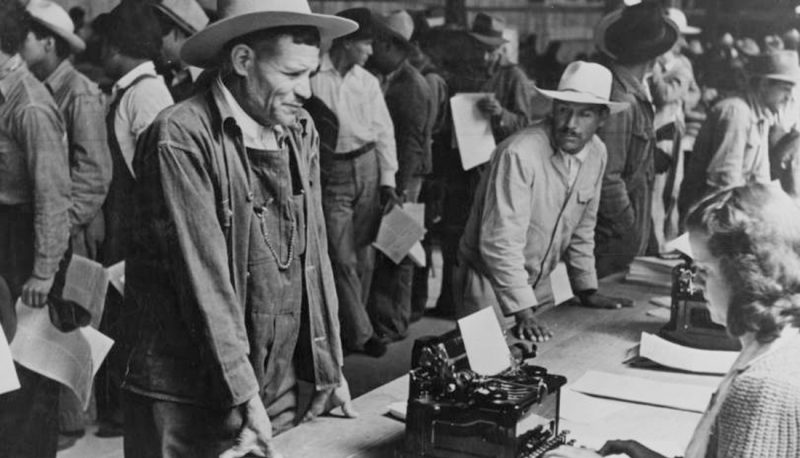“Confirmed Judges, Confirmed Fears” is a blog series documenting the harmful impact of President Trump’s judges on Americans’ rights and liberties and the need for the Senate to confirm President Biden’s federal court nominees to help counteract these effects . Supreme and appellate court cases in the series can be found by issue and by judge at this link.
Trump Ninth Circuit judge Patrick Bumatay wrote a 2-1 decision that reversed a district court and required individual arbitration of claims brought in court by a group of migrant farmworkers that a farm company had violated minimum wage and state benefit laws. The November 2021 decision was in Martinez-Gonzalez v Elkhorn Packing Co. LLC.
Elkhorn Packing Company, a California farm labor contractor, hired Dario Martinez-Gonzalez and many other Mexican residents as migrant workers legally brought to the US temporarily during lettuce-harvesting season. One of the many forms that Martinez-Gonzalez and others were directed to sign, at the end of a long day harvesting lettuce in the parking lot of the hotel where Elkhorn put them up temporarily, was an arbitration agreement calling for individual arbitration of any disputes with the company. After several seasons working for Elkhorn, Gonzalez filed a suit against Elkhorn in state court, on behalf of himself and other migrant workers, contending that Elkhorn was failing to pay required minimum wages and violating state law provisions concerning meals and other benefits.
Elkhorn removed the case to federal court and claimed that the dispute was covered by the individual arbitration agreement and could not be pursued in court on behalf of the group of farmworkers. The district court held a two-day bench trial on the arbitration issue and determined that the agreement could not be enforced because it resulted from “undue influence and economic duress” by Elkhorn. The company appealed to the Ninth Circuit.
Trump judge Bumatay wrote a 2-1 ruling that reversed the district court and ruled that the arbitration agreement had to be enforced, so that Gonzalez and the group of Mexican farmworkers could not pursue any claims covered by the agreement in court. Bumatay maintained that “without disturbing any of the district court’s findings of fact,” Martinez-Gonzalez had failed to show that Elkhorn had committed a “wrongful act” under state law, which would be necessary to prove undue influence and economic distress, and that “reasonable alternatives were available” to him, such as revoking the arbitration agreement within ten days. Since he failed to do that, Bumatay ruled, the agreement stood and Martinez-Gonzalez was required to pursue claims through individual arbitration.
Judge Johnnie Rawlinson strongly dissented. Based on prior case law, she explained that Bumatay was required to find “clear error” in the trial court’s findings in order to reverse a judgment of economic duress and undue influence in entering into the arbitration agreement. While Bumatay paid “lip service” to the “deference we owe to the district court’s factual findings,” she continued, the majority had actually and improperly made their own findings “based on their own weighing of the evidence,” which “impermissibly” conflicted with the “detailed factual findings made by the district court.”
Specifically, Rawlinson wrote that based on the district court’s factual findings, Elkhorn had committed the “wrongful act” necessary to prove economic duress under state law by “direct[ing] the migrant workers to sign the Arbitration Agreements after transporting them twelve hours from home, staging the signings in a parking lot with no seating after a day in the fields, and providing no explanation or opportunity to review the documents,” with Martinez-Gonzalez having to stand in line “for approximately forty minutes” to sign the agreements and a number of other documents plus supervisors urging him and others to “hurry so that those still waiting in line could also sign.” Rawlinson pointed out that under California law, no crime or tort is required to constitute a “wrongful act” and “all that is required” is action that is “sufficiently coercive to cause a reasonably prudent person” to “succumb to the perpetrator’s pressure.” Based on the facts and the law, Rawlinson concluded, the district court “did not clearly err” in concluding that Elkhorn’s overall conduct to push the signing of the agreement “rose to the level of a wrongful act.”
As to the claim that Martinez-Gonzalez had “reasonable alternatives,” Rawlinson explained that Bumatay’s arguments “cannot withstand the force of the district court’s factual findings.” For example, the assertion that Martinez-Gonzales could simply have revoked the arbitration agreement ignores the fact that “there was no way” he would have known about the revocation clause in the contract, since he “was not allowed to read” it, the provisions were “not explained to him,” he was “never provided copies,” and the “documents were gathered up by the supervisors immediately after signing.” Coupled with such facts as the workers’ presence in the US only because of visas obtained by Elkhorn, that they were told they had to sign the documents to continue working, and that they were told they would be sent back to Mexico if they did not work hard, Rawlinson concluded that the district court correctly “determined that Martinez-Gonzalez had no reasonable alternative but to succumb to Elkhorn’s pressure to sign” the arbitration agreements.
As a result of Trump judge Bumatay’s decision, however, Martinez-Gonzalez and other migrant farmworkers will be required to individually arbitrate their claims, meaning that Elkhorn will likely continue to be able to exploit these workers. The decision also sets a bad precedent for future cases where corporations seek to use arbitration agreements to stop minimum wage and other legal claims by their workers. The case emphasizes the importance, as part of our fight for our courts, of confirming fair-minded federal judges who will respect workers’ rights and can counteract the troubling votes of Trump judges.

